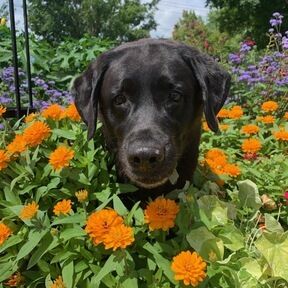Visit Us:
1184 South East Street, Amherst, MA 01002
Hours:
Open 9 a.m. until 4:30 p.m. Daily
Oregano, a plant from the mint family, is a signature flavor of many Italian, Mexican, and Spanish dishes. Oregano starts as a ground-hugging rosette of leaves, but it can easily grow to about two feet tall. A handful of plants will provide you with enough oregano to use fresh in season and to dry for use throughout the rest of the year. Although it is grown predominately as a culinary herb, oregano makes a nice edging plant and ground cover, requiring little maintenance. Also does well in rock and alpine gardens. Oregano is also a bee magnet. Bees love the pinkish white oregano flowers and will cover the plants, taking up nectar and pollen. Plant in full sun to part sun. Height up to 2', Spread to 2'. Perennial, Zone 5.

Shelby
Greenhouse Greeter
Andrew’s Greenhouse is a third generation family farm owned by Andy and Jacqui Cowles that now specializes in the propagation and retail sale of a wide variety of perennials, annuals, vegetables and herbs.
The garden center is located on 150 acres in picturesque South Amherst, MA. The farm was established in 1856 and the present barn built in 1871. The Cowles family bought the farm in 1920 and over the years have raised cattle and various crops, including vegetables, strawberries and hay.
Enjoy the website, and please join Andy and Jacqui and their enthusiastic, knowledgeable employees on the farm this spring.
BIOLOGICAL CONTROL IN OUR GREENHOUSES
Integrated Pest Management (Biological Control) protects the natural enemies that help keep bad pests (aphids, whiteflies and thrips) that are common carriers of plant diseases and viruses in check. It avoids unnecessary chemical use that may endanger human health, wildlife and the environment. Broad-spectrum chemicals also damage the beneficial soil life and insect predators that keep plants healthy.
We have been using biological controls for pest management in the greenhouses for over 10 years. This program works on a preventive basis. Some beneficial insects are introduced before the first plants are placed in the greenhouse, others are day length sensitive and need to wait for longer days and warmer weather.
Watch for our ‘Good Bugs at Work’ signs designating which plants we are using to either provide a breeding ground for our beneficial insects or a food source.
Using biological controls requires patience, allowing the good bugs the time to do their task of either eating or parasitizing the bad bugs.
We do not use any neonicotinoids, and strongly believe in the importance of protecting our pollinators.
Hours:
Open 9 a.m. until 4:30 p.m. Daily